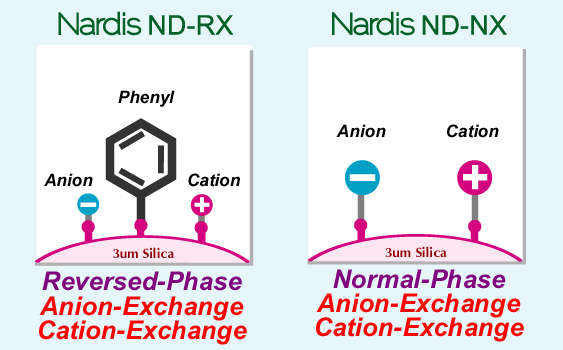When conventional columns struggle with retention and separation,

MAIN SPECIFICATIONS
| Nardis ND-RX | Nardis ND-NX | |
| Particle size: | 3μm | 3μm |
| Pore size: | 13nm | 13nm |
| Stationary phase: | Phenyl group + Weak anion group + Weak cation group | Weak anion group + Weak cation group |
| Separation mode: | Reversed-phase + Both ion-exchange | Normal-phase + Both ion-exchange |
| Target molecular weight: | Below 10kDa | Below 10kDa |
| pH range of use: | 1.5 - 8 | 1.5 - 8 |
| Column pressure resistance: | 3600psi / 250bar / 25MPa (1-6mm ID) | 3600psi / 250bar / 25MPa (1-6mm ID) |
Basic Knowledge
- Definitions of Normal-phase and Reversed-phase
- Elution Behavior of Normal-phase + IEX (Nardis ND-NX) and Reversed-phase + IEX (Nardis ND-RX)NEW
- Both Ion-Exchange Properties
Nardis ND-RX (reversed-phase) and ND-NX (normal-phase) columns are introduced with weak anion and weak cation groups. This enhances the retention and separation of primarily strong ionic compounds. The weak ion-exchange groups introduced in both columns are the same and have properties described in the title link.
CAUTION
The dual ion-exchange column is not designed for simultaneous analysis of cationic and anionic substances. The stationary phase contains ion ligands, so it is essential to use a pH modifier and appropriate ion strength in the mobile phase.
As it operates in ion-exchange mode, "gradient elution" is necessary when using this column.
Since the stationary phase consists of weak ion-exchange ligands, substances with multiple ionic functional groups or weakly ionizable substances with a pKa of 4-5 may result in multiple peaks under certain analysis conditions.
Please note that this product does not guarantee retention or peak shape for all substances. Optimization of the analysis requires careful adjustment of the mobile phase (organic solvent, pH, ion strength).

